1. Why Compliance Certifications Matter in Titanium Export
You’ve sourced the right titanium grade, confirmed the dimensions, and your supplier has delivered on time. But just as the shipment reaches your customer—or worse, their local customs office—everything grinds to a halt.
The problem isn’t the titanium itself.
It’s the paperwork.
In the world of titanium exports, compliance documentation is often the silent deal-breaker. Whether it’s a missing EN 10204 3.1 certificate, an unacknowledged PED requirement, or a forgotten RoHS declaration, small lapses in documentation can lead to big consequences:
- Delayed customs clearance
- Shipment rejections
- Contract penalties
- Damaged buyer trust
These certifications aren’t just bureaucratic formalities. In many cases, they’re legal requirements, especially in the European Union, United Kingdom, and high-spec industries like medical and aerospace.
What makes compliance certifications especially tricky is that they don’t always come from material standards like ASTM or ISO. Instead, they involve:
- Pressure vessel regulations (like PED and CE)
- Testing documentation (like EN 10204 3.1 / 3.2)
- Environmental compliance (RoHS, REACH)
- Process validation (NADCAP, ISO 17025)
For buyers and suppliers alike, failing to understand when these are required—and how to prepare for them—can derail an otherwise flawless order.
Compliance documentation isn’t the cherry on top. It’s part of the foundation.
2. PED, CE and EU Pressure Equipment Compliance – What You Must Know
If you’re exporting titanium products like tubes, flanges, or pressure-bearing components into the European Union, there’s one set of letters you can’t afford to overlook: PED — the Pressure Equipment Directive.
When Does PED Apply?
- The product will contain or transfer pressurized fluids or gases
- It's being installed into vessels, reactors, condensers, or chemical systems
- It exceeds pressure-volume thresholds defined by EU law
Products Typically Affected:
- Titanium tubes or pipes
- Titanium flanges, elbows, reducers
- Titanium-clad vessels or heat exchangers
What PED Compliance Requires:
- A PED-compliant quality system
- EN 10204 3.1 or 3.2 material certificates
- Possibly Notified Body (NoBo) inspection or approval
Just because a titanium tube looks flawless doesn’t mean it’s PED-compliant.
Don’t confuse CE with PED—CE is only valid if the product meets PED requirements through the correct conformity route.
3. EN 10204 3.1 / 3.2 – Mill Test Certificates Explained
EN 10204 defines inspection documents for material compliance.
3.1 Certificate:
- Issued by manufacturer’s QA team
- Includes heat number, mechanical & chemical properties
- Signed and traceable
3.2 Certificate:
- Everything in 3.1
- Plus a third-party or customer representative signature
- Common for critical applications under PED
Key Takeaways:
- 3.1 is standard for most EU titanium deliveries
- 3.2 must be coordinated in advance
- Many buyers use “certification” to mean EN 10204 3.1
- Always request certificate samples before confirming orders
4. RoHS, REACH and Titanium: Are You Really Compliant?
Titanium is inert—but coatings, welding materials, or packaging might not be.
RoHS:
- Restricts lead, cadmium, mercury, hexavalent chromium
- Applies to coatings, solders, labels, inks
REACH:
- Requires declaration of SVHCs (substances of very high concern)
- Applies if your product or packaging contains chemicals >0.1% by weight
What to Provide:
- A Declaration of Conformity (DoC)
- Material or MSDS review for coatings/welds
- RoHS & REACH statements in the invoice or shipment docs
5. NADCAP, ISO 17025, and Other Process-Based Compliance Needs
NADCAP:
Required in aerospace & defense sectors for:
- Heat treatment
- NDT (ultrasonic, X-ray, dye penetrant)
- Chemical processing
- Welding
Without NADCAP, titanium parts may be excluded from flight-critical assemblies.
ISO 17025:
Applies to third-party testing labs.
- Validates mechanical, chemical, and metallurgical tests
- Required when issuing EN 10204 3.2 certificates
- Supports audit and regulatory review
6. Final Checklist: What to Confirm Before Shipment
Make sure your shipment includes:
- [ ] EN 10204 3.1 or 3.2 certificate
- [ ] PED declaration or CE compliance if required
- [ ] RoHS / REACH declaration
- [ ] Valid process documents (NADCAP, ISO 17025)
- [ ] Clear indication of material standard (ASTM, AMS, ISO)
- [ ] Signed test reports with traceability (heat number, dimensions)
When in doubt: ask, confirm, and document.
Appendix: Compliance Type vs. Titanium Product – Quick Reference Table
| Compliance Type | Applies To | Typical Products |
|---|---|---|
| PED / CE | EU pressure equipment | Tubes, heat exchangers, reactor parts |
| EN 10204 3.1 / 3.2 | Mill test certificates (esp. EU) | Bars, plates, forgings, pipe fittings |
| RoHS / REACH | EU environmental compliance | Anodes, coated parts, welded structures |
| NADCAP | Aerospace and defense manufacturing | Heat-treated bars, fasteners, aerospace assemblies |
| ISO 17025 | Independent testing verification | 3.2 documents, regulated project submissions |
Conclusion
Compliance documentation isn’t a burden. It’s a competitive advantage.
Understanding PED, EN 10204, RoHS, REACH, and related certifications helps you:
- Avoid shipment rejection
- Build trust with high-level buyers
- Navigate regulatory markets with confidence
Because in titanium exports, you’re not just delivering metal—you’re delivering proof.
Share this article
Written by : 钛合金网
Follow us
Table Of Content



